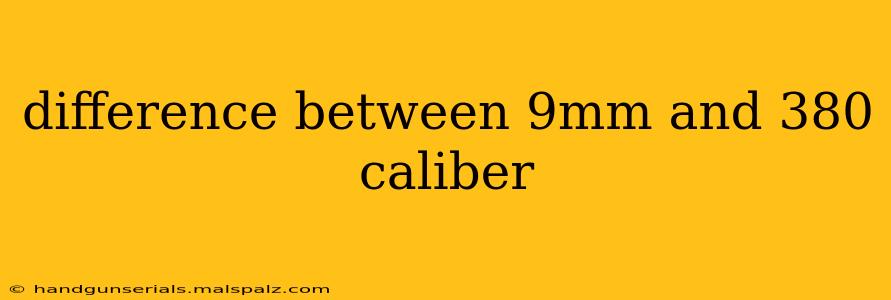Choosing the right caliber for a handgun is a crucial decision, influenced by factors like intended use, personal preference, and legal restrictions. Two popular choices often compared are the 9mm Parabellum (9x19mm) and the .380 ACP (9x17mm). While both are relatively small pistol calibers, significant differences exist in their performance and suitability for various applications. This comprehensive guide delves into the key distinctions between 9mm and .380 ACP ammunition.
Caliber Size and Ballistics: The Core Differences
The most fundamental difference lies in the cartridge size itself. The 9mm is a larger round, possessing greater powder capacity and projectile weight. This translates directly into superior ballistic performance:
- Velocity: 9mm rounds generally have a significantly higher muzzle velocity than .380 ACP rounds. This means they travel faster and retain energy over longer distances.
- Energy: The increased powder charge in 9mm cartridges results in substantially more kinetic energy upon impact. This higher energy translates to greater stopping power and penetration.
- Penetration: 9mm ammunition, particularly with full metal jacket (FMJ) rounds, penetrates deeper than .380 ACP. This is a critical consideration for self-defense scenarios.
- Recoil: The increased power of the 9mm cartridge also means it generates more recoil. While manageable for most shooters, this can be a factor for individuals with less shooting experience or those seeking a less-powerful handgun.
Practical Considerations for Choosing Between 9mm and .380 ACP
The choice between these calibers should depend heavily on intended use:
Self-Defense:
For self-defense, the 9mm generally offers a more substantial advantage due to its higher stopping power and greater penetration. The increased energy is crucial in incapacitating a threat quickly and effectively. However, the greater recoil may be a factor for some users.
Concealed Carry:
Both calibers are popular choices for concealed carry. The .380 ACP's lighter recoil and smaller size can make it more comfortable to carry for extended periods, particularly for smaller individuals. However, the 9mm's superior stopping power remains a significant advantage in a self-defense situation. The choice often boils down to individual comfort and preference.
Target Shooting and Recreation:
Both calibers are suitable for target shooting and recreational use. The 9mm is often favored for its greater accuracy and less pronounced recoil compared to some other larger calibers, while the .380 provides a gentler shooting experience.
Ammunition Availability and Cost:
9mm ammunition is generally more readily available and often less expensive than .380 ACP ammunition. This factor can be significant for regular shooting practice or maintaining a large supply for self-defense.
Beyond the Ballistics: Handgun Considerations
The choice between 9mm and .380 ACP also impacts the handgun itself. 9mm handguns tend to be larger and heavier to accommodate the larger cartridge. .380 ACP handguns are typically smaller and lighter, making them easier to conceal and handle for individuals with smaller hands.
Conclusion: The Right Caliber for You
The "better" caliber between 9mm and .380 ACP depends entirely on the shooter's needs and preferences. The 9mm generally offers superior stopping power and penetration, making it a preferred choice for self-defense. However, the .380 ACP provides a less powerful, but still effective, option with reduced recoil and smaller size. Carefully consider your intended use, physical capabilities, and personal preferences when making your decision. Remember to practice regularly with any firearm you choose to ensure proficiency and safety.

